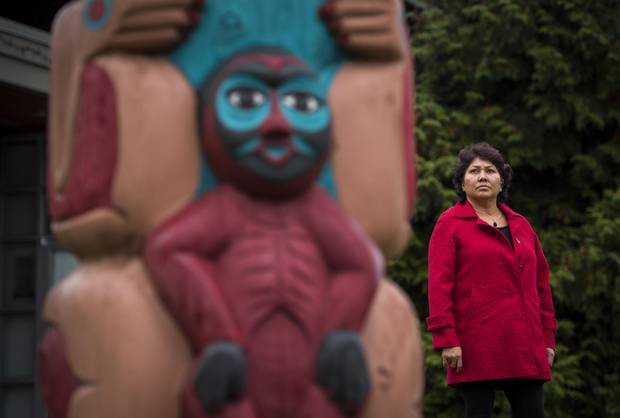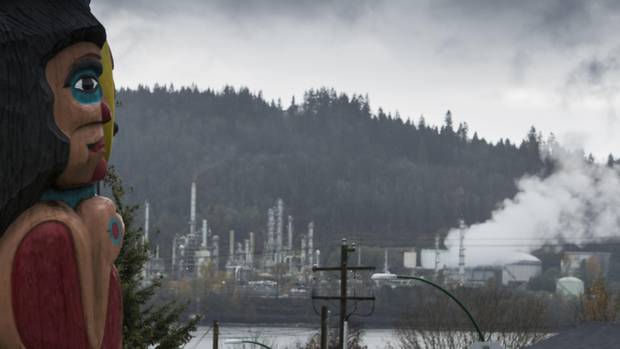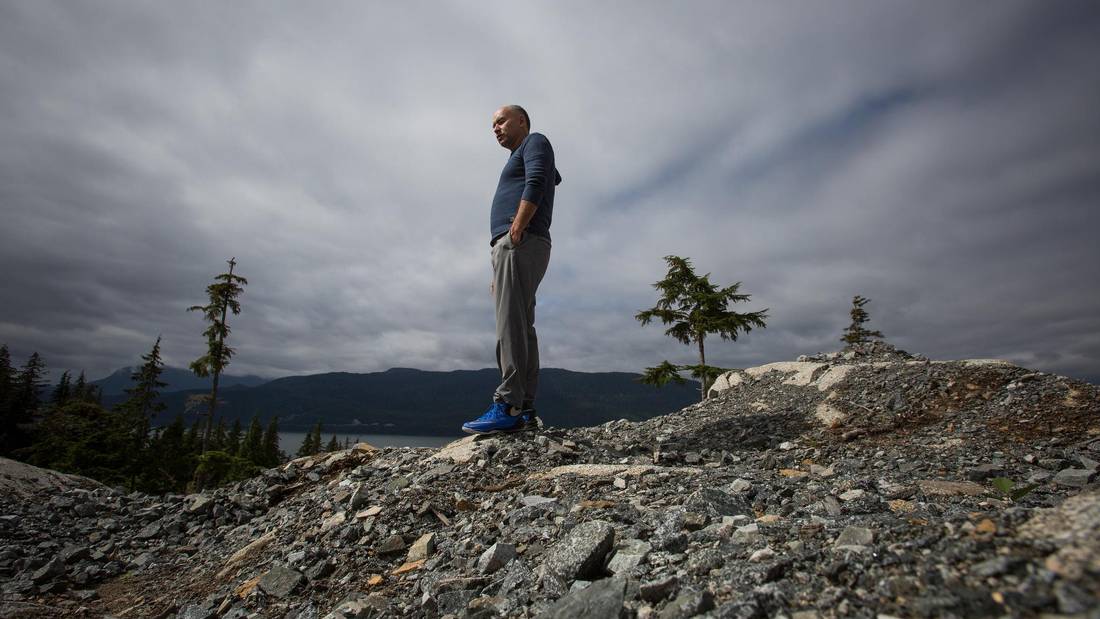The opposition to Kinder Morgan's TransMountain pipeline expansion by coastal First Nations was formalized with the raising of a totem pole on Tsleil-Waututh territory three years ago. The totem poll, overlooking Burrard Inlet toward Kinder Morgan's Westridge Terminal in Burnaby, is a tangible statement that no amount of consultation can bring about their consent for this project.
"Our laws, traditions and ceremonies are written in our art, our songs and our stories," said Tsleil-Waututh Nation councillor Charlene Aleck. That totem pole is not just a symbol, she explained, but it enshrines a commandment to this community to "warrior up" against Kinder Morgan.
Under Canadian law, that isn't necessarily a deal-stopper for the Trudeau government, which must decide by the end of this year whether to approve the TransMountain expansion to the West Coast. Canada needs pipelines to access new markets and to maximize the value of its resources, the federal Liberals say. The duty to consult with affected First Nations does not constitute veto power.
Related: How activists hobbled pipelines with bolt cutters and a plan, and why it's easier than you think
Globe editorial: Natives, oil and gas, and a search for common ground
But Prime Minister Justin Trudeau has also promised to uphold an international standard for indigenous rights that requires consent for such developments from First Nations. It's a commitment that will change the ground rules for project development in Canada.
In the runup to the past federal election, the Liberal Party of Canada promised it would fully adopt the United Nations Declaration on the Rights of Indigenous Peoples – brushing aside warnings from the incumbent Conservative government that some of the language in the document could give indigenous communities an effective veto over resource development.

Tsleil-Waututh Nation Band Councilor Charlene Aleck.
John Lehmann/For The Globe and Mail
During the campaign, Mr. Trudeau embraced the notion that the country's First Nations would assume more control over resource development, telling the aboriginal broadcaster APTN that he would "absolutely" accept a "no" from indigenous communities if they could not be persuaded to accept an oil pipeline through their territories.
In British Columbia, with tens of billions of dollars' worth of development currently proposed on lands that are subject to aboriginal land claims, the provincial government warns that UNDRIP could put jobs and the economy at risk, because the declaration requires states to obtain from indigenous people "their free, prior and informed consent before adopting and implementing legislative or administrative measures that may affect them."
In 2007, 144 UN member states agreed to the language that sets minimum standards for the survival, dignity and well-being of the world's indigenous peoples. Canada was, under the federal Conservative government, one of four UN countries to oppose the declaration.
Last May, however, the new federal Liberal government officially shifted Canada's position: "We intend nothing less than to adopt and implement the declaration in accordance with the Canadian Constitution," Carolyn Bennett, Minister of Indigenous and Northern Affairs, told the UN to cheers and a standing ovation.
More recently, the Liberals have acknowledged that implementation is not a simple task. "With respect to the UNDRIP, it is important to appreciate how it cannot be simply incorporated, word for word, into Canadian law," Justice Minister Jody Wilson-Raybould told aboriginal leaders in September.
There is a range of political support for UNDRIP in Canada. Alberta Premier Rachel Notley has endorsed it and has asked her ministers to figure out how the principles can be implemented, particularly around resource development. In British Columbia, opposition leader John Horgan promises a B.C. NDP government would officially adopt the declaration. But B.C. Premier Christy Clark told reporters the document has some "really problematic … clauses that would seem to suggest that First Nations could have an absolute veto over resource development on any of their territories."
British Columbia will be the testing ground for what implementation of UNDRIP means, as nowhere else in Canada has the scale of proposed development come up against so many unresolved land claims.
First Nations leaders don't like the word "veto" but they expect the declaration will lead to a new relationship where seeking consent is simply part of the way of doing business in Canada.
"Not all projects will get built," said Perry Bellegarde, National Chief of the Assembly of First Nations, in an interview. "The ones that are done in a proactive way, with the full involvement and inclusion of us from Square One, will have a greater likelihood of success."
If UNDRIP were in place today, here's how some current projects might be impacted.
TRANS MOUNTAIN
A ship receives its load of oil from the Kinder Morgan Trans Mountain expansion project’s Westeridge loading dock in Burnaby, B.C.
Jonathan Hayward/The Canadian Press
The National Energy Board has concluded the project, which would triple Kinder Morgan's existing oil pipeline capacity bringing Alberta oil to the coast, would be in Canada's national interest despite some environmental impacts and risks. The federal cabinet is required to decide by December if it will approve the project.
Along the pipeline route, the company has letters of support from 41 aboriginal groups and it says it will not cross any reserve lands without the consent of those communities. At the same time, there is a significant opposition from First Nations. Under UNDRIP, who has the power to give consent, and who has the power to say No?
Ken Coates has authored two studies on UNDRIP for the Macdonald-Laurier Institute, and although he supports the intent of the declaration, he warns that the vague language does not address the unique complexities of Canada's indigenous governance. Without clarity, he warns, proposals such as TransMountain will be mired in legal gridlock.
"We really need in the country to have a more comprehensive discussion about how we are going to develop resources in an environment where you have true indigenous partnerships. This is not about, 'how you get one project passed?' Otherwise you are going to have a battle every single time."
Perry Bellegarde, National Chief of the Assembly of First Nations, said Kinder Morgan would have benefited from having the declaration in place from the start. "If it was adopted and embraced by both federal and provincial governments, it would create economic stability and economic certainty," he said. "It really means involving indigenous people right from the beginning, in the development and design of any major project – not after it is half-built. That's where you get into the conflict."
PACIFIC NORTHWEST LNG

An artistic rendering of Pacific NorthWest LNGs proposal for a liquefied natural gas dock, suspension bridge and export terminal on Lelu Island, near Prince Rupert, B.C.
Pacific NorthWest LNG
This week, aboriginal leaders filed a lawsuit seeking to block the proposed $36-billion liquefied natural gas project near Prince Rupert. But who speaks for indigenous peoples? Four of the five Tsimshian communities that are directly affected by the development have signed term sheets that could lead to impact and benefit agreements.
Vancouver lawyer Doug Eyford is an expert in aboriginal law, and spent three years negotiating an agreement between five First Nations to allow expansion of the Port of Prince Rupert. That experience shows one of the risks of accepting UNDRIP holus-bolus.
"In Prince Rupert, you have five, sometimes six, First Nations all claiming unextinguished title to the very same area in the port," he said. The declaration doesn't define who has the right to negotiate consent, which could heighten disputes about authority. "If the UN declaration is implemented in a way that is supposed to represent a new legal regime governing Crown-aboriginal relations, it is going to make a difference," he said. "It is going to complicate matters – it is not going to in my view serve the interests of either the Crown, industry or aboriginal communities."
Bob Joseph is a consultant for Indigenous Corporate Training Inc., which provides guidance to governments and industry on how to successfully work with First Nations in B.C. to get projects approved.
He said the questions of consent will likely be resolved in the courts, but in general UNDRIP provides a better road map for proceeding with projects. "If I was talking to developers, I would say the rights are collectively held rights – they are not held by individuals. We need to consult more broadly with the community. Maybe you have the chief and council on side but the hereditary chiefs are not. You have to talk to those folks. Anything less than broad community support and you face legal risks."
SITE C
A rendering of the Site C dam on the Peace River in B.C.
BC Hydro is well into construction of the $9-billion hydroelectric dam on the Peace River. A worker-accommodation lodge with 1,600 rooms has been completed, hundreds of hectares of land have been cleared and more than $1-billion has been spent to date.
Ken Coates, senior fellow in Aboriginal and Northern Canadian Issues for the Macdonald-Laurier Institute, said the federal government would find it tougher to ignore that opposition. "What you have in UNDRIP is the heft of international public opinion. For First Nations, it says the world is behind their aspirations for local autonomy and local control [and] you must gain aboriginal support before you proceed."
Ed John, grand chief of the First Nations Summit, which represents British Columbia's indigenous political leadership, says "everything changes" if UNDRIP was in force. It would mean B.C. and Canada could not unilaterally approve the flooding of Treaty 8 lands. "Then we have the decision-making authority in our territories, affecting our lands and resources."
However, he rejects the term "veto."
"You won't find the word veto anywhere in the declaration. … But you would need to respect the authority of the Treaty 8 First Nations. … 'Free, prior and informed consent' is about decision-making processes."



